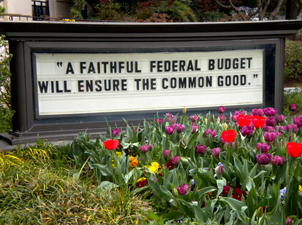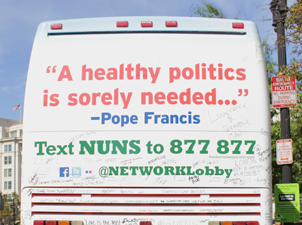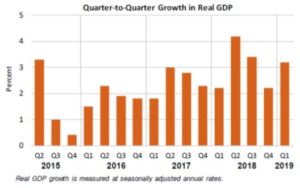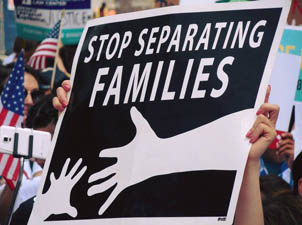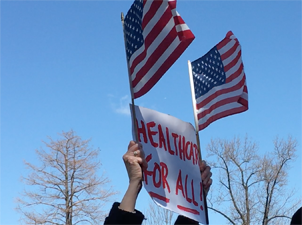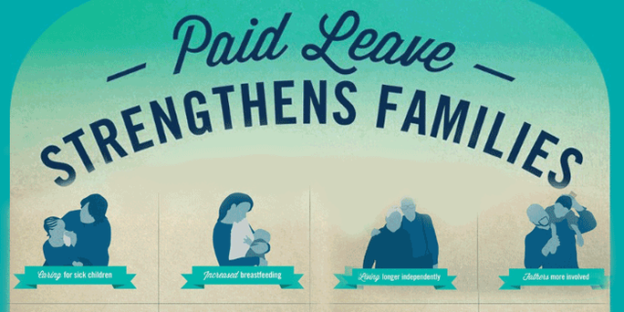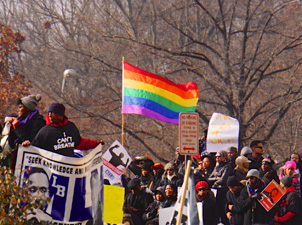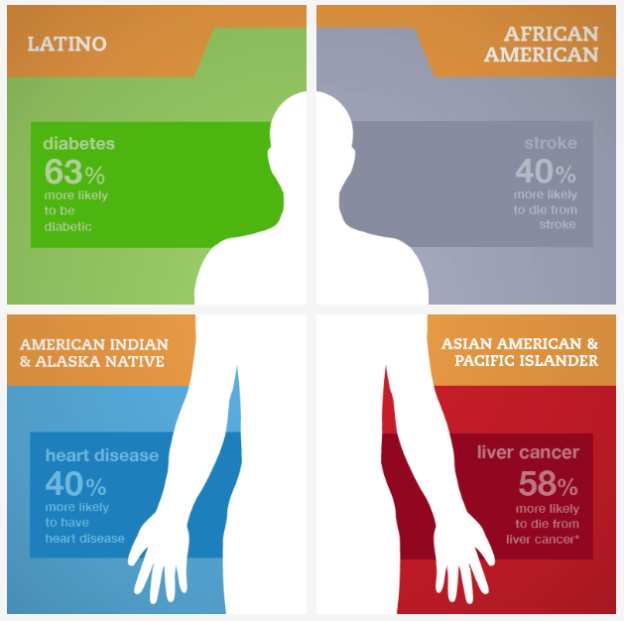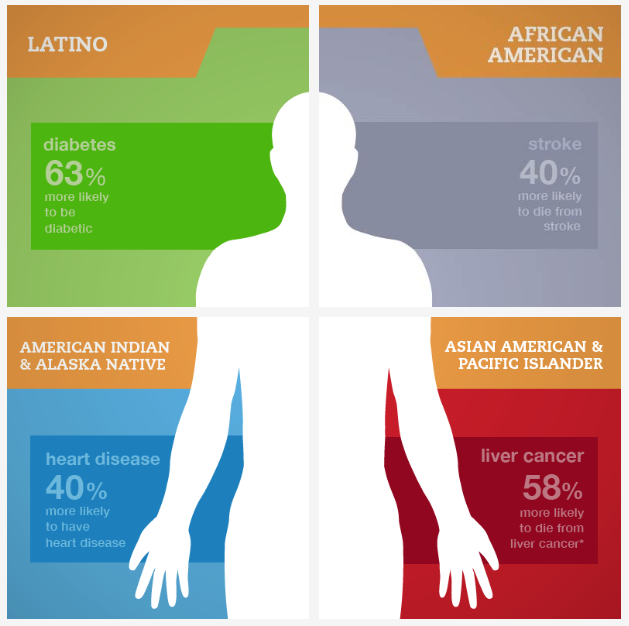
Trump Budget Fails to Mend the Gaps
Tralonne Shorter
May 24, 2019
In March, President Trump released his federal budget for Fiscal Year 2020 (FY 2020). The budget proposed across-the-board spending cuts by at least 5 percent.
At NETWORK, we believe the budget is a faithful, moral document that should reflect our values as a country. What’s not faithful is the President’s FY 2020 budget which proposes drastic cuts to non-defense discretionary spending by $2.7 trillion over 10 years (a 10% reduction from FY 2019), $8.6 billion to fund a superfluous Southern border wall, the elimination of dozens of social programs for working families, while also siphoning billions of dollars into defense programs through the Overseas Contingency Operations slush fund.
Historically, Congress rarely passes a president’s budget without any changes. However, because of sequestration caps imposed in 2011, without agreement by Congress to lift spending caps, steep cuts to discretionary funding will take effect. The caps set in the Budget Control Act of 2011 would trump even the President’s proposed FY 2020 budget by imposing a 10 percent cut ($125 billion) across the board in 2020.
NETWORK urges Congress to reject the Trump administration’s abandoning of vital investments in affordable housing, healthcare, Medicaid, SNAP, and an accurate 2020 Census –instead calls on Congress to raise the budget caps and pass a faithful budget that invests in the common good.
A faithful budget would invest in healthcare and nutrition, housing, and a fair and accurate 2020 Census.
Here’s how President Trump’s FY 2020 budget proposal would impact the Common Good:
Irresponsible, Superfluous Spending to Secure the Southern Border
- $5.4 billion in border security technology, infrastructure, and equipment at the Department of Homeland Security (DHS).
- $3.6 billion in new military construction resources at the Department of Defense
- $478 million to hire and support 1,750 additional law enforcement officers and agents at Customs and Border Patrol and Immigration and Customs Enforcement (ICE).
- $2.7 billion in total funding for 54,000 average daily ICE immigration detention beds.
- $4.5 billion of additional funding to cope with a surge of migrants at the U.S. southern border in a supplemental budget request to Congress.
Prioritizes Profits over the Health and Well-Being of the Common Good
- Proposes more than $1.2 billion in net mandatory health savings
- Repeals the Affordable Care Act and Medicaid Expansion
- Replaces ACA coverage with an inadequate block grant, while also imposing a per-capita cap on the rest of the federal Medicaid program.
- Decentralizes the administration of Medicaid to the states by creating a new federal-state partnership
Inadequately Funds 2020 Census
- The President’s FY 2020 budget request sets aside $12.2 billion for the Department of Commerce and provides a $6.1 billion budget for the Census Bureau — an increase of more than $2.3 billion from fiscal 2019 enacted levels.
- The budget request is $900 million short of Secretary Ross’ previous estimate of $7.4 billion for decennial operations alone; despite the need to conduct field tests of the new IT systems the Census Bureau plans to implement in 2020.
- Inadequate funding has contributed to the cancellation of two of the three end-to-end field tests originally planned and could threaten the accuracy, and ultimately increase the overall cost of the Census.
- The Census Bureau now estimates the 2020 Census will cost $15.6 billion, $3 billion more than original estimates. including better efforts to collect despite a $1.2 billion in contingency funding
Citizenship Question
For the first time since 1950, the decennial Census would ask households whether their members were U.S. citizens. In response, 18 states have sued the Commerce Department to prevent the inclusion of this question, more than 160 mayors from both parties wrote Secretary Ross requesting removal of the question, and several former Census directors warned about the risks and costs associated with including a citizenship question.
Inadequately Supports Working Families in the Workplace
- The Trump budget would offer a limited paid family leave proposal only targeted to families with newborn or newly adopted children. The president’s budget excludes adult children caring for aging parents or parents caring for disabled children.
- Further, the budget’s budget only funds 6-weeks of leave, which is inconsistent with the 12-weeks of guaranteed leave offered through the existing FMLA law.
- The Trump budget provides a one-time, mandatory investment of $1 billion for a competitive fund aimed at supporting underserved populations and stimulating employer investments in child care for working families; placing the burden on states to sustain.
Housing Proposals Would Increase Poverty and Put Families on the Street
- Overall, the administration proposes to cut HUD by an astounding $9.6 billion or 18% below 2019 enacted levels, imposing deep cuts to affordable housing and community development, as well as other essential programs that ensure basic living standards.
- The President’s proposal would eliminate or deeply cut essential housing and community development programs like the national Housing Trust Fund, the HOME Investments Partnership program, and public housing capital repairs.
- Additionally, the budget would eliminate the Community Development Block Grant (CDBG) program, the HOME Investment Partnerships program, Choice Neighborhoods grants, the Section 4 Capacity Building program, and the Self-Help Homeownership Opportunity Program.
- There is no discussion of how eliminating CDBG would impact future disaster relief efforts, which heavily rely on CDBG-Disaster Recovery funds to address unmet housing and infrastructure needs.
- The budget would increase rents and imposing work requirements on current and future tenants requiring tenants to pay 35 percent of their gross incomes, compared to 30 percent of their adjusted incomes previously, on their rents. The very poorest elderly and disabled families would also see their rents triple up to 30 percent of their gross incomes or $50, whichever is higher.
- The budget would cut funding for tenant-based rental assistance (TBRA). The request provides $22.244 billion for TBRA. At this amount, the budget request does not provide enough funding to ensure that all contracts are fully renewed. As a result, NLIHC and others expect that this would result in the loss of thousands of vouchers.
- The budget proposal would provide $12.021 billion to renew project-based rental assistance (PBRA) contracts, an increase of $274 million from the FY19 funding level. This will likely not be sufficient to renew all existing contracts.
- Public housing takes a huge hit under the Trump budget proposal. The public housing capital fund, which received $2.775 billion in FY19, would be eliminated in FY19. The allocation for the operating fund would fall significantly, from $4.65 billion in FY19 to $2.86 billion, or 38 percent.
- President Trump would fund homeless assistance programs at $2.599 billion, or $34 million less than 2019 enacted levels.
- The budget provides $644 million to the Section 202 Housing for the Elderly program, a $34 million decrease from this year’s funding level.







